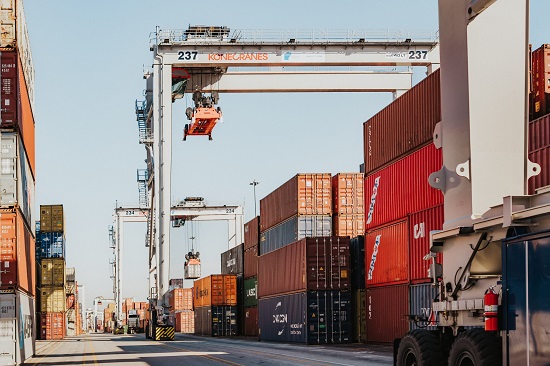The Georgia Ports Authority has agreed to spend $170 million on 55 hybrid-engine rubber-tired gantry cranes to outfit the Port of Savannah’s Ocean Terminal, as it is redeveloped into an all-container facility.
“This significant investment in new equipment will help prepare the Port of Savannah to handle more ships and cargo while maintaining the world-class service our customers have come to expect,” said GPA executive director Griff Lynch. “These new machines will expand our capabilities, operate at lower cost and leave a smaller carbon footprint than conventional diesel cranes.”
The hybrid machines will exclusively operate off electric battery power, with diesel generators running only to recharge batteries. This will reduce fuel consumption by an estimated 47% compared to all-diesel machines. Per year, that is a reduction of 8,800 gallons of diesel per crane, or nearly 500,000 gallons annually across the Ocean Terminal fleet. This will result in a fuel purchase savings of more than $1.6 million per year at current rates.
The new cranes reduce emissions by half compared to conventional diesel cranes. At an annual average of 4,000 operating hours each, the hybrid engines will avoid yearly emissions of 127 tons per crane, or nearly 7,000 tons across the 55 crane fleet.
“With every infrastructure expansion, the Georgia Ports Authority seeks to ensure its operations progress toward improved long-term sustainability,” said GPA board chairman Joel Wooten. “Economic development, environmental stewardship, governance, and employee and community engagement are all important facets in that effort.”
The gantry cranes will use special “whisper” movement alarms that sound like static, rather than the typical three-tone alarms. The whisper alarms don’t penetrate long distance, but do provide safety for nearby personnel, effectively making the machines quieter and reducing noise emissions. The combination of hybrid power and quieter alarms will help control the sound of operations for neighboring communities. The new cranes can work stacks that are six containers high and seven wide – one container wider than the port’s current cranes. Wider stacks mean fewer rows and a denser, more efficient use of space. The cranes currently serving Ocean Terminal will be repurposed in other areas of operation.
The cranes are one part of the renovation of the 200-acre Ocean Terminal. The Authority is also establishing two big ship berths at the facility, and improving the paving surface to hold container stacks. These projects will bring to six the number of neopanamax vessels the Port of Savannah can handle simultaneously. To work the larger ships, GPA will add eight new all electric ship-to-shore cranes at Ocean Terminal by 2026. The taller ship-to-shore cranes will replace three older cranes that are not suited to handling neopanamax vessels. When complete, the terminal’s annual capacity will reach 2 million twenty-foot equivalent container units.
A key partner for the Georgia Ports Authority is the Georgia Department of Transportation. GDOT will play an important role in the terminal’s completion and traffic control around Ocean Terminal.
“GDOT is currently reviewing plans to route port traffic directly from the terminal onto U.S. 17/Interstate 16, avoiding near-port streets, which could minimize community impacts,” said Susan Gardner, senior director of operations and projects. “Directing trucks in this manner will expedite cargo, while preventing unnecessary traffic in neighboring communities.”
SC
MR


More Ports & Shipping
- Shining light on procurement’s dark purchases problem
- As Red Sea Crisis Drags On, Shippers Eye Alternatives
- Global Container Shipping Industry Sets Sights on Tech Investment, Capacity Concerns
- US Ports to Share $653M in Funding to Improve Throughput, Reduce Emissions
- The Astonishing Port of Laredo
- Navigating the Panama Canal Drought: Tips to Get Your Shipments Moving
- More Ports & Shipping
Latest Podcast

 Explore
Explore
Topics
Procurement & Sourcing News
- How S&OP provides the answer to in-demand products
- There is still work to do to achieve supply chain stability
- Blooming success: The vital role of S&OE in nurturing global supply chains
- How one small part held up shipments of thousands of autos
- Shining light on procurement’s dark purchases problem
- 40% of procurement leaders ignoring sustainability, study reveals
- More Procurement & Sourcing
Latest Procurement & Sourcing Resources

Subscribe

Supply Chain Management Review delivers the best industry content.

Editors’ Picks





